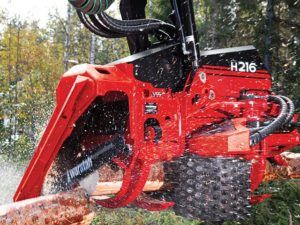Purdue Grant Focuses On Forest Development
U.S. Dept. of Agriculture has awarded a $10 million grant to Purdue University to help landowners and stakeholders better adapt their forests to increasingly complicated economic and climate conditions in the Eastern U.S. About 5 million small, private landowners control just over half the acreage of forests in the Eastern U.S. This contrasts with Western U.S. forests, which are mostly publicly owned. Purdue and its project partners—the University of Georgia, the University of Maine and the U.S. Forest Service—aim to improve the management of 15 million acres of those forests, an area nearly as large as the state of West Virginia.
The project encompasses the northern hardwood forest in the Northeast, the central hardwood region, and the southern pine and mixed hardwood.
“We will provide the digital tools that allow rapid response and precision management to improve forest health,” says Songlin Fei, a professor of forestry and natural resources and the Dean’s Chair of Remote Sensing at Purdue.
Called PERSEUS (Promoting Economic Resilience and Sustainability of the Eastern U.S. Forests), the project invokes the hero of Greek mythology who slew the fearsomely snake-haired Gorgon Medusa. In its modern incarnation, PERSEUS will work to protect forestry’s many benefits, which include timber and fiber production along with climate mitigation. Their long-term sustainability, however, faces threats from climate change, evolving markets and land-use changes.
“The high interest in carbon has renewed interest in forest, while complicating their overall management,” says Aaron Weiskittel, the Irving Chair of Forest Ecosystem Management at the University of Maine. “PERSEUS will work to provide a more holistic approach to forest management, while giving landowners new tools to guide decision-making.”
Partner institutions will add to the depth of the research, applying digital tools and artificial intelligence to a variety of areas and forest types. Working together, the team will explore ways to merge data collected from drones, satellites and other sources in an AI environment to automate forest inventories. They will also help build systems to analyze ecosystem services provided by forests, as well as the environmental footprint of the forestry supply chain.
“We need to provide research, extension and outreach products to benefit private forest landowners of the Eastern United States,” says Pete Bettinger, the project lead at the University of Georgia’s Warnell School of Forestry and Natural Resources. “And we need to design systems that improve the efficiency of data development and the accessibility of information related to alternative management options.”
PERSEUS is part of Purdue’s cross-disciplinary Center for Digital Forestry, which includes faculty members from the colleges of Agriculture, Engineering, Science and Liberal Arts; Purdue Libraries; and the Purdue Polytechnic Institute. As one of the five strategic investments in Purdue’s “Next Moves,” the center leverages digital technology and multidisciplinary expertise to measure, monitor and manage urban and rural forests to maximize social, economic and ecological benefits.
PERSEUS will guide landowner decision-making via a digital framework for visually representing current and future forest trends so that landowners will have data upon which to base their decisions.
The project also will enhance the Center for Digital Forestry’s ongoing efforts to produce a digitally competent next-generation workforce.
“This is the future,” Fei says. “If the U.S. agricultural sector wants to stay competitive, we will need to put a lot of energy into this area.”
Latest News
New From Waratah: H216 Hardwood Head
Waratah Forestry Equipment has added to the 200 series lineup with the H216—a new two-roller head built for hardwood. The H216 is strong enough to handle the toughest tree forms with accuracy and efficiency. Its simple design with excellent feed power, delimbing, and large cut capacity provide productive tree harvesting. Weighing in at 3,296 lb., the H216 is ideal for hardwood harvesting, late or final thinnings. Floating roller arms allow for superior and easy tree horizontal movement and easy log transport through the head. High performance single or multi-speed options keep timber moving quickly.
Oregon Undertaking Forest Workforce Study
As part of its education funding bill, Oregon is undertaking a forestry workforce study. Led by Associated Oregon Loggers’ Amanda Sullivan-Astor, forest policy manager, who was instrumental in its passage, the legislation tasked the Oregon Higher Education Coordinating Commission to evaluate the forest sector workforce and analyze career paths, capacities, demographics, benefits, needs, recruitment and retention.
WANT MORE CONTENT?
Spanning seven decades since its inception in 1952, Timber Harvesting highlights innovative and successful logging operations across the U.S. and around the world. Timber Harvesting also emphasizes new technology and provides the best marketing vehicle for the industry’s suppliers to reach the largest number of loggers in North America and beyond.
Call Us: 800.669.5613

